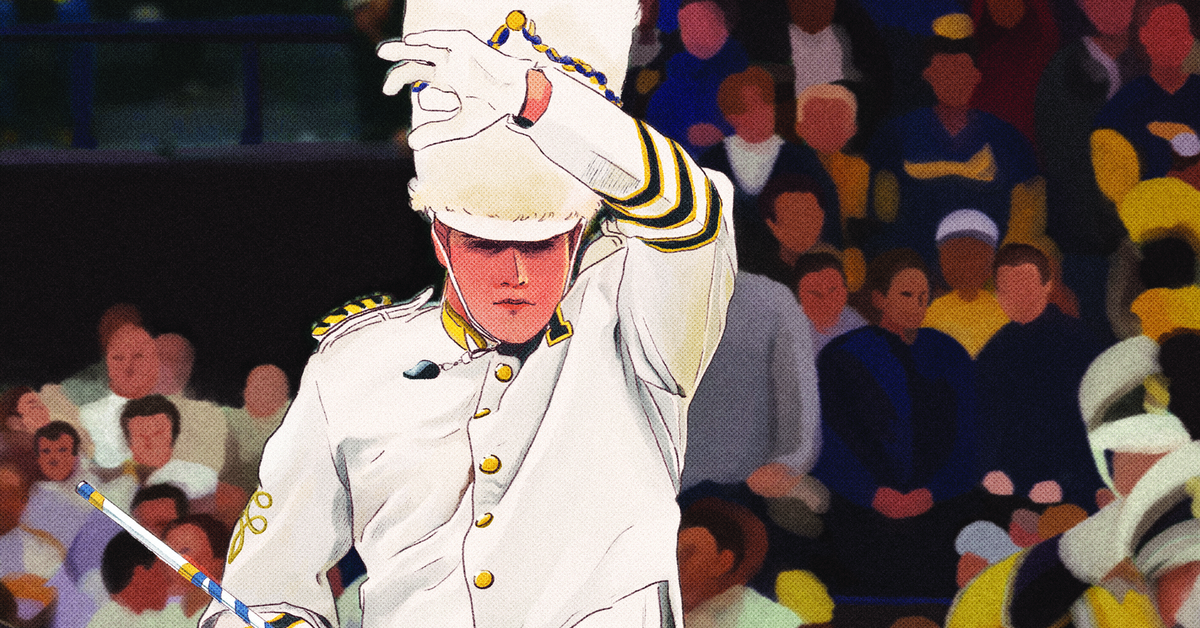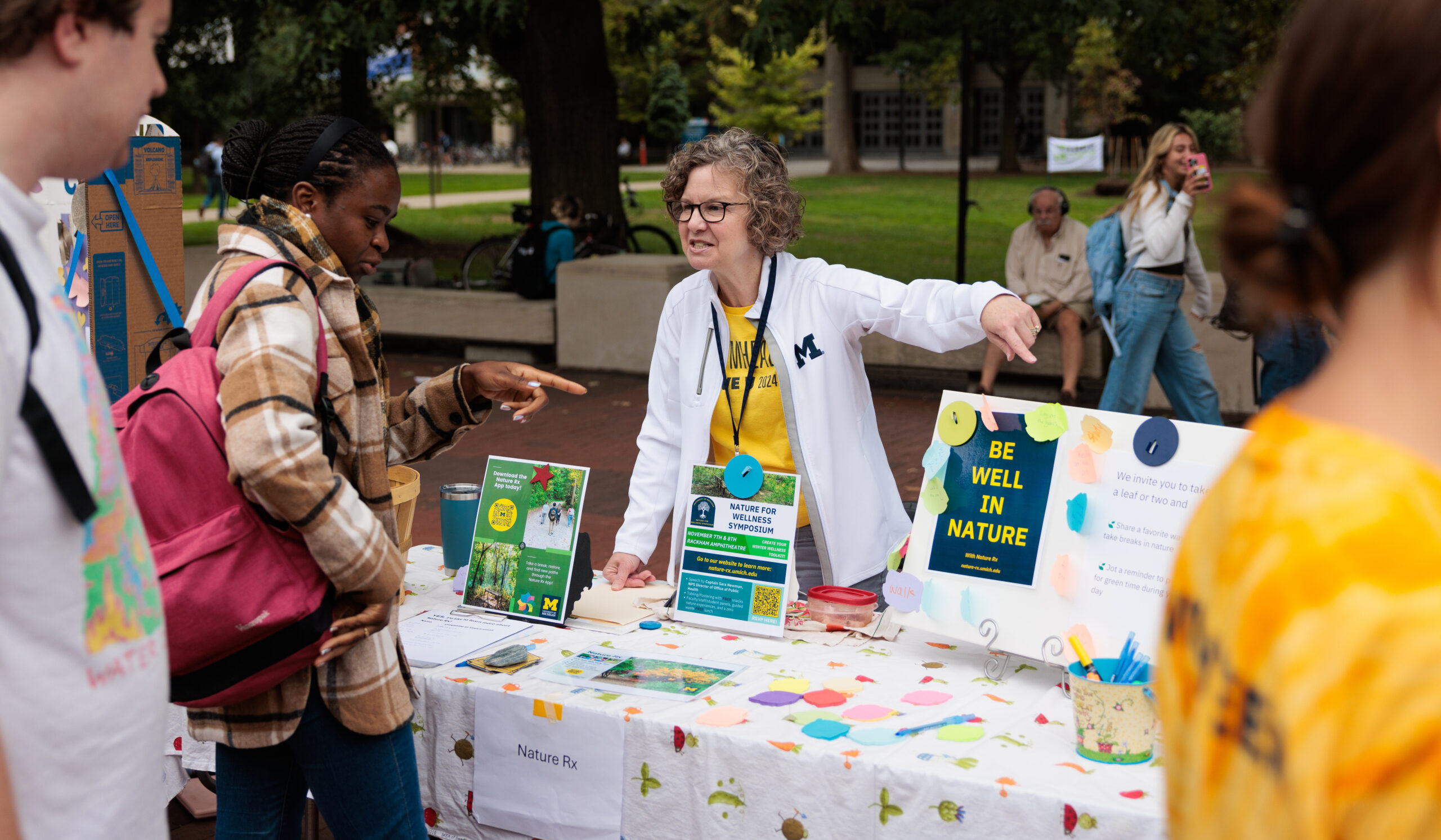I will never forget the day I met him. The year was 1998, and I was thrilled to be dressed in my Michigan Marching Band (MMB) uniform in preparation for U-M’s game against Penn State. As a “shadow reserve”—a marcher who shadows a rank’s spot in case someone is injured, late, or sick—I did not get to perform on the field that day. But I did meet Allen S. Mehler, who would become one of my most trusted friends and was about to change my life.
During my first few weeks as a freshman marcher, I noticed someone who always gave instructions to the drum major, whether about a missed trick or a dropped baton. I had already decided that I was going to try out for the position. So on that footall Saturday, I mustered up the courage to speak to him. “What does it take to be the drum major of the Michigan Marching Band?” I asked.
Immediately enthusiastic, he gave so many instructions that I could barely keep up. “You need to talk to the drum major. You need to talk to the assistant drum major. You need to talk to Dr. Sedatole (the MMB director). You need to talk to Dr. Tapia (the assistant director). You need to begin training on your marching immediately. You need to talk to the twirlers.” And on he went.
Over the next few months I began to prepare for my training. I learned how to twirl and began to run, lift, and swim to get into shape. Doc Mehler and I would chat from time to time, and I began to learn more about him. He had been a twirler before women were admitted in 1972. He had tried out for drum major many times (even after returning from podiatry school) but had not been elected. When he came to practices to help marchers with foot and ankle problems, you could tell that his passion for the band and the University had not diminished with the years.
That spring, I sprained my ankle while learning the drum major strut and couldn’t walk without limping. The audition was 20 days away, and I thought I would never be ready. The directors told me to give Doc Mehler a call, and I found myself in an over-the phone appointment with him. Within 24 hours, he had a hinged brace ready for me along with a page of notes on how to reduce swelling, heal the tendons, compensate mentally, and still train for the audition.
Hope was rekindled.
The band chooses a drum major by anonymous ballot after they have seen a candidate speak, demonstrate, march, do back bends, and strut. In short, my first audition didn’t succeed. But it got me started and intensified my dream. As my sophomore year went by, I trained even harder. Doc Mehler was always there, giving advice and sharing his own battle stories. I fell short again in my next audition, but my improvement from the year before was substantial.
The next year, Doc Mehler became my main coach. We met at the Central Campus Recreation Building late Tuesday and Thursday nights. In those precious hours, while walking the track after my running set, we discussed everything—from my true motivations for the drum major position to my relationship with my immensively supportive sister, Christina, who struggled with spina bifida. I drew strength from her example as she overcame challenges with her disability.
The audition during my junior year was my finest to date. I made very few mistakes and performed to the best of my ability, only to fall short yet again. That summer was one of the worst times of my life; I couldn’t remember when I had felt so low and almost decided to let go of the dream.
But I began to prepare for my “last stand” and train for one last audition. The Doc and I resumed our “track chats” and had weekly dinners and phone calls, strategizing about the events of the audition and discussing ways to maximize my strengths and minimize my weaknesses.
On April 21, 2002, an hour before the audition, I knelt in the Big House and said my last thankful prayers. I was proud of everything I had achieved and was content just to be myself. I then proceeded to my best audition ever and heard my name called as the 2002-03 drum major. So it came to pass, in my fourth audition, in my fourth year of school, on the fourth month, I became the 44th drum major of the Michigan Marching Band in its 104th year.
As I look back at all of the time and energy that I put into the whole endeavor, I realize that I truly could not have achieved my dream without the help from so many—my family, housemates, friends, classmates, band members, and the Almighty. However, I owe so very much of my success as drum major to Doc Mehler. He is one of the few men, other than my father, who has helped me become the man I am today.
And through two college lifetimes of effort, we realized the dream we shared.
Matt Cavanaugh, ’03, is originally from Sterling Heights, Michigan, and currently resides in Arlington, Virginia. He participates as one of the performing alumni drum majors with the Michigan Marching Band alumni band at homecoming nearly every year.





